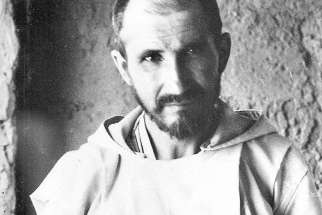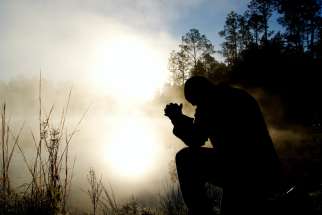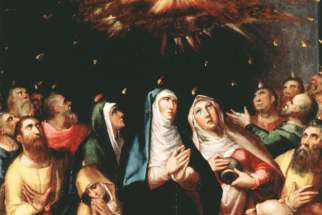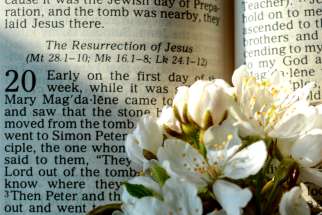Most Holy Trinity (Year C) June 12 (Proverbs 8:22-31; Psalm 8; Romans 5:1-5; John 16:12-15)
God is described in countless ways in the Scriptures, confirming that God cannot be contained by any one image or symbol. The ancient sources do not use the theological precision that modern people are used to and can at times appear to be inconsistent or contradictory. This can be confusing to some. The God-language of Scripture inspires the sacred imagination of the reader or hearer, revealing the depths and activities of the divine.
Seeking silence in our confused times
It’s impossible to hold a real conversation when it’s peppered with mean, toxic words. The more our attempted conversation becomes thwarted by invective, the more we lose the ability to hear and speak at all. A silence creeps forth, not the sweet silence of life and growth but the terrible silence of contempt, disdain and denial.
Sick and tired becomes sick then saved
“Healing” is a hot topic today. Humanity seems to feel a keen need of healing today, but are we getting to the root cause of our maladies? Are we utilizing the proper remedies? Since human beings are a composite of body and soul, we can’t talk about healing one without healing the other.
Be your own Maverick
I had the great pleasure to see Top Gun: Maverick last weekend. Considering the action flick netted a Memorial Day weekend record $156 million domestic box office haul, I was one of many Canadians and Americans taking the “highway to the danger zone.”
Pentecost Sunday (Year C) June 5 (Acts 2:1-11; Psalm 104; 1 Corinthians 12:3b-7, 12-13; John 20:19-23)
If a hundred believers were asked to explain the nature, role and workings of the Holy Spirit, there would probably be 100 or more answers. Backed into a corner, many have little understanding of the Spirit and its actions. The Holy Spirit has been invoked to bolster authority and to challenge it; to support the status quo and to overturn it; to head in new theological and spiritual directions and to retreat behind the fortified walls of tradition.
Ascension of the Lord (Year C) May 29 (Acts 1:1-11; Psalm 47; Ephesians 1:17-23; Luke 24:44-53)
Our worldview and understanding of the cosmos are very closely linked with our theology and image of God. If one changes, the other must also adapt. Although this is usually met with resistance, these changes have occurred many times in the past and will continue to do so.
The false divide of spiritual and religious
If you’re reading The Catholic Register, you’ve probably never said: “I’m spiritual but not religious.” However, you’ve certainly heard someone else state this now almost cliché phrase. Let’s count the ways this phrase is false… and dangerous. (What I generally say to people who tell me they are “spiritual but not religious” is: “You may want to be careful with that.”)
Sixth Sunday of Easter (Year C) May 22 (Acts 15:1-2, 22-29; Psalm 67; Revelation 21:10-14; 22-23; John 14: 23-29)
What must one do to be saved? This is an age-old question and is fraught with many related issues. What does it mean to be “saved,” and from what? This is not as obvious as it might at first appear, for there have been different answers to those questions depending on when, where and under what conditions they were asked.
Our journey to paradise
Fourth Sunday of Easter (Year C) May 8 (Acts 13:14, 43-52; Psalm 100; Revelation 7:9, 14b-17; John 10:27-30)
Religious people often are reluctant to hear new things. There is a great deal of comfort in what is known and predictable. Anything that disturbs this sense of the “way things are” is suspect and is seen as a threat. Nearly every new direction that religious thought has taken has been greeted with resistance, rancour and sometimes even violence. One need not look farther than the battlelines that have been drawn in the contemporary Church.
Third Sunday of Easter (Year C) May 1 (Acts 5:28-32, 40b-41; Psalm 30; Revelation 5:11-14; John 21:1-19)
There are some words that just cannot remain unspoken. They burn within and demand to be shouted from the rooftops. Jeremiah the prophet discovered that when he tried to resign as prophet and not speak the name of the Lord anymore. He could not contain himself.
The infinitely fruitful horror of the Cross
In Christ’s resurrection, we find the paradox of Christian faith — a God who bends away from displays of power and whose divinity is recognized by humble people to whom the Risen Lord has shown His face. The great event on which the world turns — the Resurrection — was witnessed by no one. Christ left an empty tomb and in His appearances went unrecognized until He willed the disciples to see His face.
Second Sunday of Easter (Year C) April 24 (Acts 5:12-16; Psalm 118; Revelation 1:9-11a, 12-13, 17-19; John 20:19-31)
The people of Jerusalem must have sensed and felt the power emanating from the group of Jesus believers gathered in Solomon’s Portico. Many wanted to join them but were hesitant or afraid — it all seemed so strange and new. And yet many did join them, and their numbers continued to grow.
Toward the new joy of Easter
On Ash Wednesday, March 1 this year, we began a new journey of faith — our Lenten journey. Our 40-day Lenten journey of penance and austerity brings us to the celebration of Easter: a time of joy, light and life.
Behold the Man, the model of humanity!
On March 20, 2022, Archbishop Christian Lépine celebrated a Thanksgiving Mass to mark the 10th anniversary of his appointment as Archbishop of Montreal.















